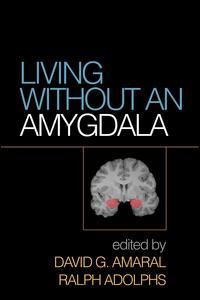Living without an Amygdala
Coordonnateurs : Amaral David G., Adolphs Ralph

Bringing together leading researchers, this book comprehensively covers what is known about the amygdala, with a unique focus on what happens when this key brain region is damaged or missing. Offering a truly comparative approach, the volume presents research on rats, monkeys, and humans. It reports on compelling cases of people living without an amygdala, whether due to genetic conditions, disease, or other causes. The consequences for an individual's ability to detect danger and regulate emotions--and for broader cognitive and social functions--are explored, as are lessons learned about brain pathways and plasticity. The volume delves into the role of the amygdala in psychiatric disorders and identifies important directions for future research. Illustrations include six color plates.
1. A Tale of Survival from the World of Patient S. M., Justin S. Feinstein, Ralph Adolphs, & Daniel Tranel
2. A Synopsis of Primate Amygdala Neuroanatomy, Cynthia M. Schumann, Martha V. Vargas, & Aaron Lee
3. A Short History of the Lesion Technique for Probing Amygdala Function, David G. Amaral
4. Role of the Rodent Amygdala in Early Development, Emma Sarro & Regina M. Sullivan
5. Foraging in the Face of Fear: Novel Strategies for Evaluating Amygdala Functions in Rats, Jeansok J. Kim, June-Seek Choi, & Hongjoo J. Lee
6. Lifetime Consequences of Early Amygdala Damage in Rhesus Monkeys, Eliza Bliss-Moreau, Gilda Moadab, & David G. Amaral
7. The Effects of Neonatal Amygdala Lesions in Rhesus Monkeys Living in a Species-Typical Social Environment, Jocelyne Bachevalier, Mar Sanchez, Jessica Raper, Shannon B. Z. Stephens, & Kim Wallen
8. The Central Nucleus of the Amygdala Is a Critical Substrate for Individual Differences in Anxiety, Jonathan A. Oler, Andrew S. Fox, Alexander J. Shackman, & Ned H. Kalin
9. Monkeys without an Amygdala, Elisabeth A. Murray & Sarah E. V. Rhodes
10. Consequences of Developmental Bilateral Amygdala Lesions in Humans, Ralph Adolphs
11. Behavioral Consequences and Compensatory Adaptations after Early Bilateral Amygdala Damage in Monozygotic Twins, Alexandra Patin & René Hurlemann
12. Consequences of Selective Bilateral Lesions to the Basolateral Amygdala in Humans, Jack van Honk, David Terburg, Helena Thornton, Dan J. Stein, & Barak Morgan
13. Attending to the World without an Amygdala, Rebecca M. Todd, Adam K. Anderson, & Elizabeth A. Phelps
14. Implications for Understanding Amygdala Function in Mental Disorders, Christopher S. Monk & Daniel S. Pine
Epilogue, David G. Amaral & Ralph Adolphs
Index
David G. Amaral, PhD, is Distinguished Professor of Psychiatry and Neuroscience and Research Director of the UC Davis MIND Institute at the University of California, Davis. His interests include the neurobiology of social behavior and the development, neuroanatomical organization, and plasticity of the primate and human amygdala and hippocampal formation, with a particular focus on understanding the biological bases of autism spectrum disorder. Dr. Amaral is Director of Autism BrainNet, which solicits postmortem brain tissue to facilitate autism research, and Editor-in-Chief of Autism Research. He is a past president of the International Society for Autism Research and a Fellow of the American Association for the Advancement of Science, among other honors.
Ralph Adolphs, PhD, is Bren Professor of Psychology and Neuroscience at the California Institute of Technology. He leads a social neuroscience laboratory that investigates the psychological and neurobiological underpinnings of social behavior, with a particular focus on the role of the human amygdala and prefrontal cortex. A major goal is to make comparisons and contrasts across different clinical populations and research techniques. Dr. Adolphs is a past president of the Association for the Scientific Study of Consciousness, a Fellow of the Association for Psychological Science, and a recipient of the Distinguished Investigator Award from the Social and Affective Neuroscience Society, among other honors.
Date de parution : 07-2016
15.2x22.9 cm



